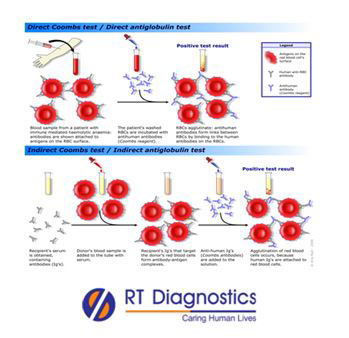Coombs (Indirect)
The main function of the Immune System is to produce Antibodies which are the fight against the harmful foreign particles that enter inside the body. Sometimes wrongly these antibodies affect the healthy red blood cells, hence causing Auto-immune Diseases called Hemolytic Anemia. This test is also known as Anti-Globulin Test. Coombs indirect test screens the antibodies present in the blood.
Coombs Indirect:
Why Coombs indirect Test?
CLINICAL INFORMATION
Coombs indirect test is also called as an indirect anti-globulin test. It helps to determine if anti-antibodies are present against the Rh factor (directed against the fetal RBCs) in the maternal blood in gestation period and/or during blood compatibility test (before blood transfusion). Thus indirect Coombs (or anti-globulin test) test screens to detect antibodies in a recipient’s or donor’s blood before transfusion (since blood transfusion of in- compatible blood groups from donor to recipient leads to fatal consequences) and moreover to determine if a woman has Rh-positive or Rh-negative blood (Rh antibody titer) is performed in early pregnancy against the hemolytic disease of the newborn also known as erythroblastosis fetalis (a protocol in a prenatal/antenatal test) i.e if maternal blood has antibodies, then precautionary steps are required to protect the fetus (against Rh antigen or Rhesus factor - Antigenicity) such a shot of Rh immunoglobulin - RhoGAM. Indirect Coombs test indicates Erythroblastosis fetalis, incompatible blood match (when used in blood bank), while abnormal (positive) Coombs test result indicates conditions such as autoimmune hemolytic anemia, chronic lymphocytic leukemia or a similar disorder, hemolytic disease of the newborn – Erythroblastosis fetalis, Mycoplasma infection, syphilis, systemic lupus erythematosis, mismatch blood transfusion (due to analytical errors – pre-analytical / post-analytical), etc. Thus Coombs test has a significant role in detecting diseases such as autoimmune hemolysis or immune-hemolytic hemolysis eg. Warm antibody autoimmune hemolytic anemia i.e Evans syndrome, SLE and/or Cold antibody autoimmune hemolytic anemia i.e Waldenstrom macroglobulinemia, infectious mononucleosis, paroxysmal cold hemoglobinuria, etc, allo-immunity (hemolytic disease of the newborn) and/or drug-induced immune-mediated mechanisms (eg. Methyldopa, Penicillin, Quinidine, etc).

General Instructions:
Sample Requirement: Specimen - Blood sample collected from the vein. Test Preparation: None.
NOTE - Sample for specimen collections may vary based on the patient’s condition/cases according to the patient’s presenting complaints/signs or symptoms:
SPECIMEN REQUIREMENT (Special or Rare Cases) - As instructed and guided by Physician / Clinician / Pathologist / as per Laboratory’s requirements, according to procedures and protocols.
Sample Requirement: Blood Sample taken from the vein
Test Preparation: None
This Multi-Specialty Clinical Referral Laboratory RT DIAGNOSTICS provides precise and accurate tests with an extensive range of testing services to the medical centers to help in the diagnosis and identification of pathology in the test specimens for infectious diseases and also to evaluate the function of organ systems of the patient. It prevents further complications and helps to stabilize and restore health to near normalcy at the earliest without delay.



